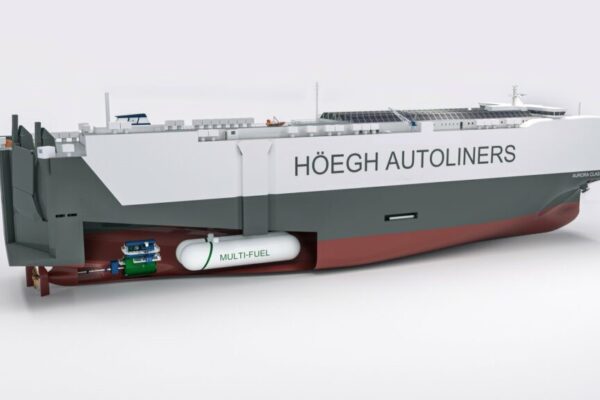We constantly keep an eye on the newsrooms of significant players in the cargo shipping industry around the world. This week, possibly to show they are on board with the aims of the Leaders’ Summit, many have issued news releases demonstrating their efforts to go green. Here is a quick round-up.
Finnlines’ 1st hybrid RoRo ship launched in China
The first of three hybrid roll-on/roll-off (RoRo) vessels operated by Finnlines shipping company was launched at the Nanjing Jinling shipyard on 26 April 2021. The new vessels will have a cargo capacity of 5,800 lane metres; their car decks have a capacity of 5,800 square metres and about 520 TEU on the weather deck. The ultra-green vessels sport several energy-saving innovations: Lithium-ion battery systems will allow zero-emission port visits as well as modern two-stroke engines, emission abatement systems, solar panels and an innovative air lubrication system will cut emissions further.
Höegh Autoliners announces its Aurora Class
On 26 April 2021, Norwegian RoRo shipping operator Höegh Autoliners launched its Aurora Class of vessels as part of its decarbonization efforts. Built by Xiamen Shipbuilding Industry, the ships will be zero-carbon ready and designed for 9,100 car equivalent units, making them the world’s largest car carriers. The Aurora Class’ multi-fuel engine can run on various biofuel and conventional fuels, including LNG. With minor modifications it can transition to use future zero carbon fuels, including green ammonia. The first vessel will be operational by the end of 2023.
HMM launches the first of 8 new energy efficient containerships
The first of South Korean carrier HMM’s eight new energy-efficient 16,000 TEU-class containerships has just entered into service. The vessels are equipped with open-loop scrubber systems embedded with hybrid-ready technology. HMM said that the ships have an improved energy efficiency enabling them to cut their carbon footprints by up to 52% percent when compared to their predecessors. Additionally, selective catalytic reduction technology will reduce nitrogen oxides by 80% or more compared to the industry average. They will also feature ballast water treatment systems and an underwater robot for hull cleaning.
UK Engineers push for sails on cargo ships
A technical policy paper issued by British-based Institution of Mechanical Engineers (IMechE) on 22 April 2021 has called on the U.K. Government to support the development of a ship with retro-fitted sails. Fitting sails to cargo ships and sailing more slowly could reduce greenhouse gas emissions from the shipping industry by up to 40% or more, according to the report. It recommends that the shipping industry seriously looks into the use of wind as the primary energy, hybrid wind and/or fossil/alternative fuels and the potential for biofuels, hydrogen and ammonia as drop-in replacements for bunker fuel.
Panama Canal targeting to become carbon neutral by 2030
On 27 April 2021, the Panama Canal has launched its process of decarbonizing its operations, targeting to become carbon neutral by 2030. Last year the canal authority said it had contributed to a reduction of more than 13 million tons of CO2 equivalent emissions. To kick off the transition, they have purchased four electric vehicles to collect data for the plan which also includes tugboats and launches that use alternative fuels, and the substitution of electricity production processes in favour of photovoltaic plants. They’ve also implemented a Maritime Single Window to reduce the carbon footprint of transhipment procedures, by streamlining logistics paperwork for international customers passing through the country.
As a licensed Customs Broker and Freight Forwarder, Colless Young offers you professional advice on all matters related to international shipping and transport. Based in Brisbane, we provide a complete range of logistics services, both air and sea cargo, through all Australian ports and airports. We handle imports and exports, trucking, warehousing and fumigation.

